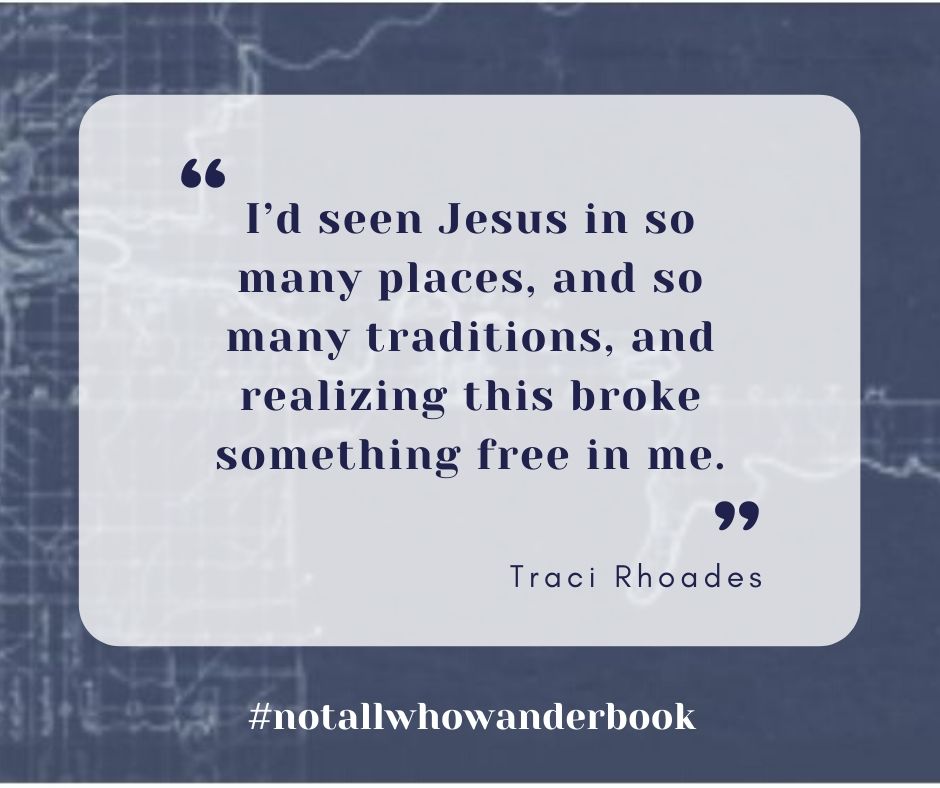|
Our contemporary Christian church era is one of skepticism, questioning, doubt and wandering. These strains take an emotional and intellectual toll on believers far and wide, and the reactions of individuals vary widely. Some leave the faith altogether, rejecting old ways as useless and false at best and corrupt and harmful at worst. Others are bewildered, and waver between belief and despair. Many churchgoers dig deep, doubling down on their traditions and building walls against anyone outside their own denominations. Anyone who spends a few hours scrolling faith discussions via Social Networks will come away wearied and pained by the spiritual drama of our time.
In Not All Who Wander (Spiritually) Are Lost (A Story Of Church), Traci Rhoades offers a refreshing outlook that both honors the best things within her own traditions and also encourages the reader to seek answers and joy among their brethren of various faith expressions. The main storyline is a personal one, and the reader follows Ms. Rhoades from a small country Methodist church in Missouri, where the doors were always unlocked and she learned to pray as a little girl, to a megachurch in a big city and to church plants and everywhere in between. Along the way, she first encounters and then seeks out those traditions she’d been informally catechized to distrust. She finds out those prejudices were wrong, and much of her wandering is a purposeful search to find out how various groups love God. This comes from a deep recognition that while her own upbringing is rich, she is missing some things that are ancient anchors of belief, that have carried the saints through all ages into greater knowledge and love of God. So she sets out, searching for these great treasures: “If I’m being completely honest, sometimes I feel cheated by the faith of my childhood. It was life-giving in so many ways, but I didn’t learn anything about church history or ancient traditions…Crossing oneself, ancient prayers, anointing the sick, confessing our sins to another, lamenting…these acts are a part of our heritage too, and can add a richness to one’s faith.” This book is not, however, a naïve cherry-picking of the happy. It does not keep the sorrow and hurt of life in general or life in church hidden. Rather, Ms. Rhoades makes it clear that she has been wounded, disappointed and disillusioned at times by individuals and collectives of those beside whom she’d lived her faith. Anyone who has been burned will immediately sense her sorrow. Yet, in the closing paragraph of the first chapter, Ms. Rhoades makes clear her position regarding these wounds: “If you’re in the church long enough, it will disappoint you, I promise. The way I always saw it, that disappointment left me with choices. I could stick it out and try to make a positive change in the church I attended. I could determine the fellowship was broken enough I needed to find a new church home. Or I could ultimately decide God was to blame for the hurt and suffering, causing me to abandon church altogether. This last choice never seemed a viable option to me.” One of the blessings of this book is that Ms. Rhoades has generously offered the stories of sixteen other wanderers. Most of these individuals have taken similar journeys, but some simply offer the stories of their own tradition, and the deep joy and harbor that they’ve known. Few authors would devote so many of their pages to other writers. Yet, for Ms. Rhoades, this is the story - multi-denominational voices singing in numerous and beautiful ways their hope and love for the divine. It harkens to the beautiful meaning behind the iconography in some liturgical traditions she explores. By loving our neighbor, venerating their faith and humility, we’ve loved God. This is what Ms. Rhoades does again and again in the pages of this edifying book. The introduction is entitled “Let’s Be Friends”, and that is the spirit of the book and also in the dialogue one can find in Ms. Rhoades’s online discourse as well. This is a book of hope. The reader can almost hear the rising intensity of joy and longing in Ms. Rhoades’s voice as she brings the final chapter and epilogue to the joyous conclusion that perhaps we can find a way to love one another, offering and accepting gifts that lead us into great unity in the faith, and love for God. If you wander, if you have been wounded in church, if you want encouragement in your meandering, and perhaps limping journey of faith, then Not All Who Wander (Spiritually) Are Lost (A Story Of Church) will be a balm to your soul.
1 Comment
|
"Examine all things; hold on to the good."
-Saint Paul the Apostle Archives
September 2022
Categories |

